

Whereas in the past I have produced several CD's nowadays most music is provided by various streaming services or Youtube, including my own YouTube channel AnnePageCambridge. The table below is therefore mainly for reference.
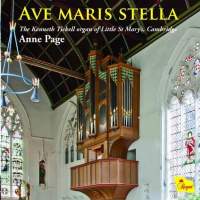
Ave Maris Stella
1. Scheidemann - Magnificat 5th Tone
(4 verses)
2. J.S. Bach - Prelude in G BWV 568,
'Gigue' Fugue BWV 577, Chorale fantasia
'Wo Gott der Herr nicht bei uns hält' BWV 1128.
3. Mendelssohn - Allegro (Choral, Fugue) in D minor (1844).
4. David Aprahamian Liddle - English Organ Mass
(7 movements).
5. John Bull - 5 verses on Salve Regina.
6. Ian de Massini - Ave maris stella
(Arabesque for organ solo).
7. Flor Peeters - Toccata, Fugue et Hymne sur
Ave Maris Stella Op.28.
8. Buxtehude - Magnificat primi toni.
First recording of the Kenneth Tickell organ in Little Saint Mary’s Church, Cambridge
This beautiful organ, installed in 2007, has a surprising range of tone colours in a relatively small number of stops, and in a wide-ranging programme of works from the sixteenth century to the present day, organist
Anne Page shows off the amazing versatility of the instrument. In keeping with the dedication of the Church, the programme is constructed around works dedicated to the Virgin Mary, beginning and ending with extended settings for solo organ of the Magnificat - the Song of Mary. Other works by Bach and Mendelssohn show off the Baroque and Classical voices of the organ.
The recording includes first recordings of works by David Apprahamiam Liddle, and Ian de Massini - the latter composer a former Director of Music at the church - and the first recording by a British organist of “Wo Gott der Herr nicht bei uns hält BWV 1128” - a recently-discovered Chorale Fantasia by Bach.
Anne Page is one the UK’s most respected solo organists and teachers. Born in Perth, Australia, she won a scholarship to study in Europe and spent two years in the class of Marie-Claire Alain at the Conservatory of Rueil-Malmaison in Paris. Further study followed with Peter Hurford in Cambridge, and then two years with Jacques van Oortmerssen at the Sweelinck Conservatory in Amsterdam brought a deeper awareness of historically informed performance. She has taught generations of organ scholars at Cambridge, and is one of the founders of the Cambridge Academy of Organ Studies. She has also been at the forefront of the revival of interest in the harmonium. In the last few years Kenneth Tickell emerged as one of the UK’s most in-demand organ builders, building highly-respected instruments in Worcester Cathedral (the Quire organ - his largest instrument), Newcastle RC Cathedral, and Cheltenham Ladies College. His sudden death in June 2014 robbed the organ world of one of its greatest builders.
This recording is dedicated to the memory of Kenneth Tickell (1956–2014).
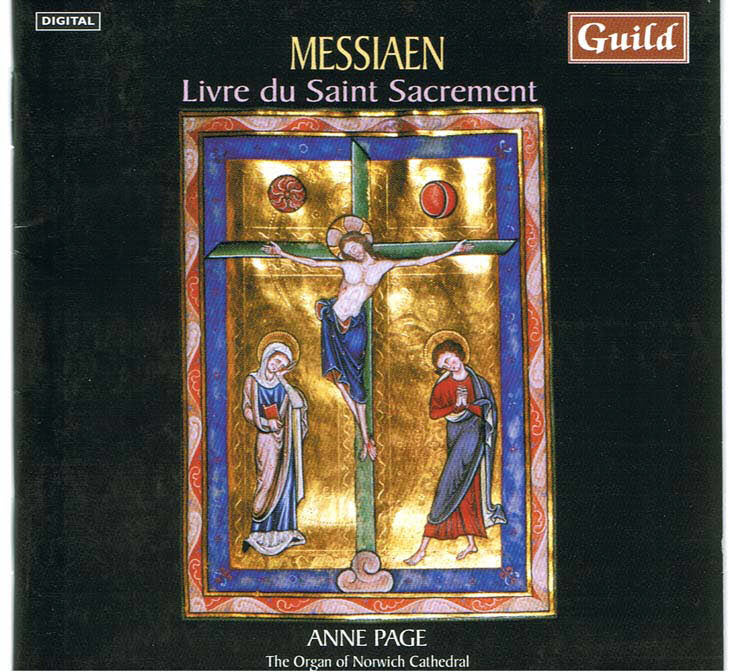 ;
;Norwich Cathedral
The Book of the Holy Sacrement is written in 1984 and Messiaen’s last work for organ. It contains eighteen movements of varying length from the twelfth piece on we have a chronological order of the events in the life of christ.
The final piece Offrande et Alleluia final is a brilliant toccata with exuberant alleluia passages on the foundation stops and mixtures with proclamations of the word 'joy' and a fortissimo conclusion. This recording is now available on my YouTube channel:
Part 1 Part 2
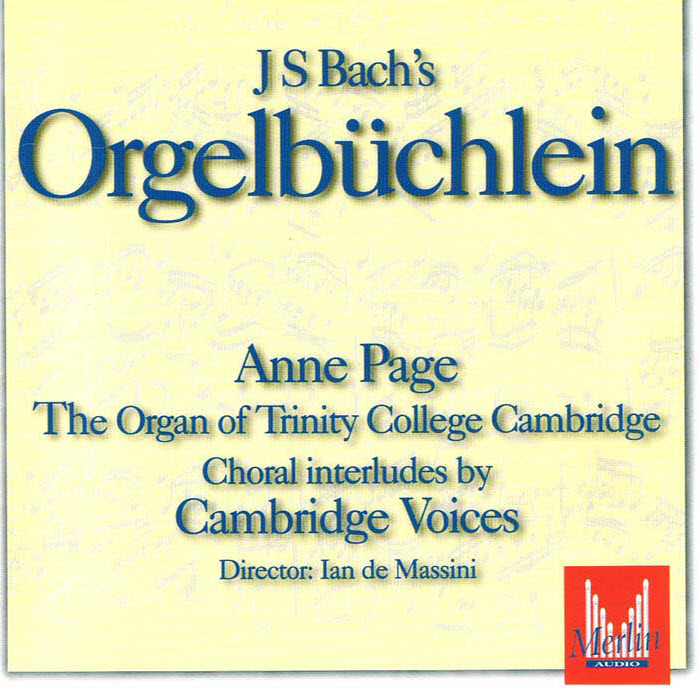
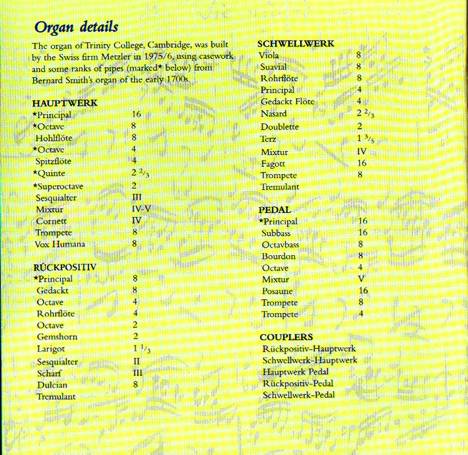
J S Bach's Orgelbüchlein
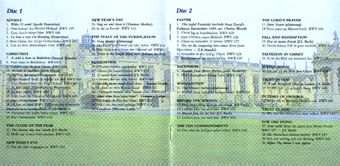
Trinity College Cambridge
The Orgelbüchlein ("Little Organ Book") BWV 599−644 is a collection of 46 chorale preludes for organ written by Johann Sebastian Bach. All but three of them were composed during the period 1708–1717, while Bach was court organist at the ducal court in Weimar. The remaining three, along with a short two-bar fragment, were added in 1726 or later, after Bach's appointment as cantor at the Thomasschule in Leipzig. The collection was originally planned as a set of 164 chorale preludes spanning the whole liturgical year.
The Orgelbüchlein was originally passed from teacher to student and was not published in its entirety until Felix Mendelssohn edited an edition. Notable editions have been made by Robert Clark and John David Peterson, Quentin Faulkner, Albet Riemenschneider, and Albert Schweitzer.
"Here Bach has realised the ideal of the chorale prelude. The method is the most simple imaginable and at the same time the most perfect. Nowhere is the Dürer-like character of his musical style so evident as in these small chorale preludes. Simply by the precision and the characteristic quality of each line of the contrapuntal motive he expresses all that has to be said, and so makes clear the relation of the music to the text whose title it bears. ” —Albert Schweitzer, Jean-Sebastien Bach, le musicien-poête, 1905 Information taken from the excellent wikipeadia article
This recording is now available on my YouTube channel: https://youtu.be/Uyla6h0z0GI
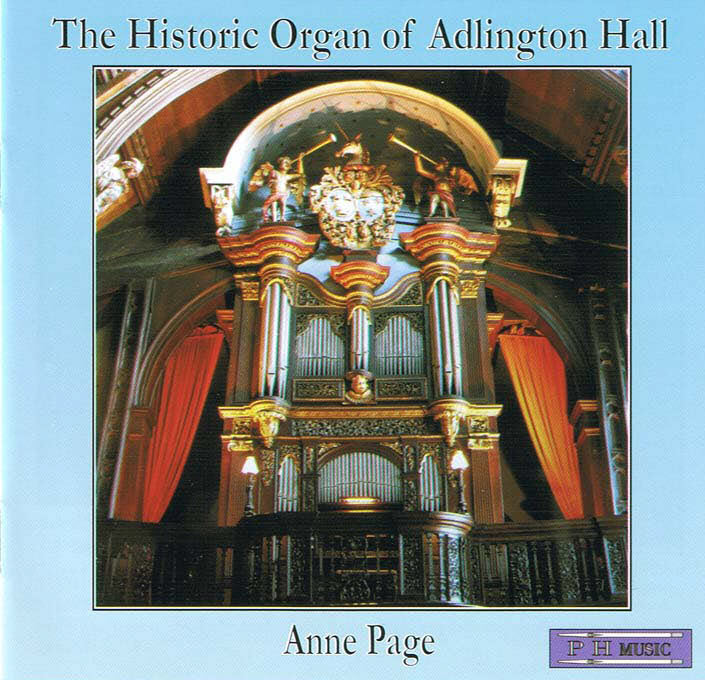
The historic organ of Adlington Hall
For details about the organ see: http://www.adlingtonhall.com/visit_the_great_organ_at_adlington_hall.html and http://www.npor.org.uk/cgi-bin/Rsearch.cgi?Fn=Rsearch&rec_index=N04410
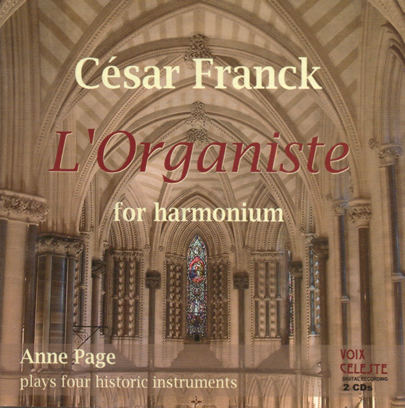
Miscellaneous historic instruments
The publisher, Enoch, had commissioned Franck to compose 100 short pieces for harmonium but unfotunatley Franck only completed 59 of them which were published posthumously as "L'Organiste"being written between (1889–1890).
This recording is now available on my YouTube channel: https://youtu.be/2CkJlyozScg